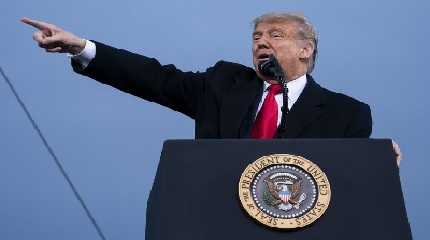
NEW YORK, Dec 1 (Reuters) - A defense lawyer on Thursday urged jurors in the criminal tax fraud trial of former President Donald Trump's real estate company to blame a greedy former senior executive and not the Trump Organization itself for any wrongdoing.
Susan Necheles, representing one unit of the Trump Organization, pointed the finger at Allen Weisselberg, the company's longtime chief financial officer, in her closing argument to the 12-member jury in a New York state court in Manhattan.
Other lawyers for the company will address jurors later, followed by prosecutors. Closing arguments are expected to end on Friday, with jury deliberations beginning on Monday.
Necheles said Weisselberg, the prosecution's star witness, was looking out for himself by accepting off-the-books perks, and not trying to benefit his employer.
"We are here today because of one reason and one reason only - the greed of Allen Weisselberg," Necheles told jurors. "The purpose of Mr. Weisselberg's crimes was to benefit Mr. Weisselberg."
Prosecutors have accused the Trump Organization of paying personal expenses for some executives without reporting the income, and compensating them as if they were independent contractors, in a 15-year scheme to cheat tax authorities.
The company faces up to $1.6 million in fines if convicted on all nine counts it faces. Trump, who is seeking the presidency in 2024, has not been charged.
Weisselberg pleaded guilty to tax fraud and other charges under an agreement with prosecutors, and is expected to serve five months in jail.
Defense lawyers also have sought to blame Donald Bender, an outside accountant who they assert should have blown the whistle on Weisselberg.
The trial began on Oct. 24 before Justice Juan Merchan.
To prove the Trump Organization guilty, prosecutors must show that Weisselberg and other executives acted as "high managerial agents" of the company when they carried out tax fraud, and that the company benefited in some way.
Weisselberg has worked for the Trump family for about five decades, and is now on paid leave.
He testified that he improperly received bonus payments as non-employee compensation and hid from tax authorities various payments from the company for his rent, car leases and other personal expenses.
Weisselberg's testimony also may have helped the defense. He told jurors he was motivated to cheat on taxes by his own greed, and once choked up on the stand while describing how he felt embarrassed about having violated the Trump family's trust.
Bender, who was granted immunity from prosecution, was the main defense witness. He testified that he trusted Weisselberg to give him accurate financial information for the company's tax returns, and had no obligation to investigate further.
Trump, a Republican, has called the charges politically motivated. Manhattan District Attorney Alvin Bragg is a Democrat, as is his predecessor Cyrus Vance, who brought the charges last year.
The criminal case is separate from a $250 million civil lawsuit filed by New York's attorney general against Trump, three of his adult children and his company in September, accusing them of overstating asset values and his net worth to get favorable bank loans and insurance coverage.
Trump also faces federal investigations into his removal of government documents from the White House after leaving office and efforts to overturn his 2020 election loss, and a Georgia state probe over attempts to undo his election defeat there.




